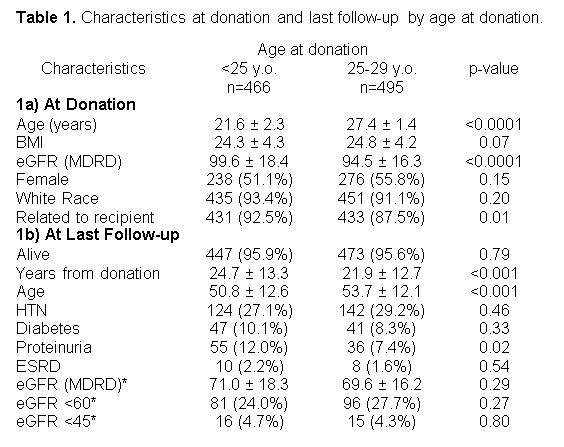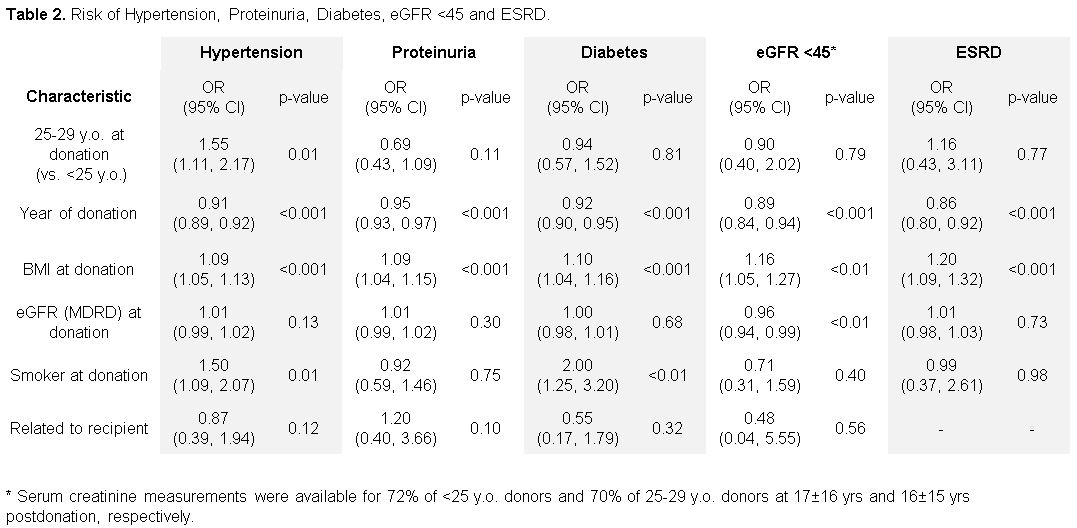Is Reluctance to Accept Younger Kidney Donors Justified?
1U of MN, Mpls
2M Health, Mpls
Meeting: 2017 American Transplant Congress
Abstract number: 374
Keywords: Age factors, Donation, Kidney, Outcome
Session Information
Session Name: Concurrent Session: Logistic and Programatic Challenges in Kidney Living Donation
Session Type: Concurrent Session
Date: Monday, May 1, 2017
Session Time: 4:30pm-6:00pm
 Presentation Time: 4:42pm-4:54pm
Presentation Time: 4:42pm-4:54pm
Location: E450b
Transplant centers are often reluctant to accept young kidney donors because of long-term concerns regarding reduced renal mass and because they have not yet reached the age where most renal disease develops. We compared outcomes of those who were <25 y.o. at donation to those aged 25-29. Between 1963 – 2015 we did 1096 nephrectomies in donors less <30 (n=542 <25; n=554, 25-29). All donors are surveyed q. 3 years for long-term health outcomes and laboratory assessment of kidney function.
Of the 1096 donors, 961 (88%) responded; 466 were <25; 495 were 25-29. Characteristics at donation are shown in Table 1a; donors <25 were more likely to be related to the recipient (p=.01) and had a higher eGFR (p<.001). Follow up for donors ≤ 25 is 25±13 years; donors 25-29, 22±13 years (Table 1b). Mean eGFR for donors ≤25 is 71±18 ml/min; 25-29, 70±16 ml/min. In an unadjusted analysis, there was no significant difference between groups in development of hypertension, diabetes, eGFR <60, eGFR <45 or ESRD (Table 2). Also, in the unadjusted analysis, more of those less than 25 at donation had proteinuria (12% vs 7%), p=0.02. In an analysis adjusted for characteristics at donation, those 25-29 were at increased risk for HTN but not proteinuria, DM or reduced eGFR. We also performed Cox proportional hazards regression to compare the time to each outcome between cohorts, adjusted for the same covariates; donors 25-29 had a significantly increased hazard for developing HTN (HR=1.4) but not the other outcomes.
Conclusion: Donors aged <25 years are not at an increased risk for the development of HTN, DM, proteinuria or low GFR when compared to those 25-29 years old. This data is supportive of the current practice that uses the same standards for donor acceptance regardless of age. This assertion, however, cannot be extended to donors from minorities as our donors were overwhelmingly White.

CITATION INFORMATION: Ibrahim H, Berglund D, Jackson S, Matas A. Is Reluctance to Accept Younger Kidney Donors Justified? Am J Transplant. 2017;17 (suppl 3).
To cite this abstract in AMA style:
Ibrahim H, Berglund D, Jackson S, Matas A. Is Reluctance to Accept Younger Kidney Donors Justified? [abstract]. Am J Transplant. 2017; 17 (suppl 3). https://atcmeetingabstracts.com/abstract/is-reluctance-to-accept-younger-kidney-donors-justified/. Accessed February 26, 2026.« Back to 2017 American Transplant Congress
